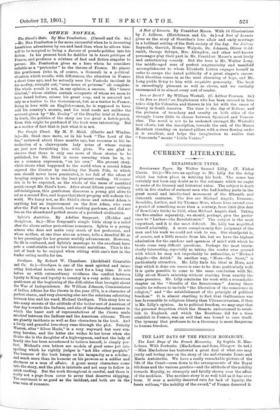Cardigan. By Robert W. Chambers. (Archibald Constable and Co. 6s.)—Cardigan
is one of the most spirited and inter- esting historical novels we have read for a long time. It sets before us with extraordinary vividness the conflict between loyalty to King and loyalty to country in a very noble American gentleman at the beginning of the difficulties that brought about the War of Independence. Sir William Johnson, Commissioner of Indian Affairs for the Crown in the year 1774, is a character of perfect charm, and very charming also are the relations subsisting between him and his ward, Michael Cardigan. This story lets us into many secrets of the attitude of the better sort of American of that day towards the Indians, and also of the shameful manner in which the baser sort of representatives of the Crown made mischief between the Indians and the American citizens. There are ghastly incidents as well as fine characters in the book. And a lively and graceful love-story runs through the plot. Felicity Warren, alias " Silver Heels," is a very wayward but very win- ning heroine, and the letter she writes to her lover when she thinks she is the daughter of a highwayman, and not the lady of family she has been accustomed to believe herself, is simply per- fect. Michael's own letters are models of good sense put into spelling which he rightly judges is "not like other people's." The humour of the book hangs on his incapacity as a scholar ; and much more than its humour on his prowess as a soldier and alertness as a man of affairs. A great many characters come into the story, and the plot is intricate and not easy to follow in quick reading. But the work throughout is careful, and there is really not a page from cover to cover that deserves skipping. The sentiment is as good as the incident, and both are in the true vein of romance.














































 Previous page
Previous page